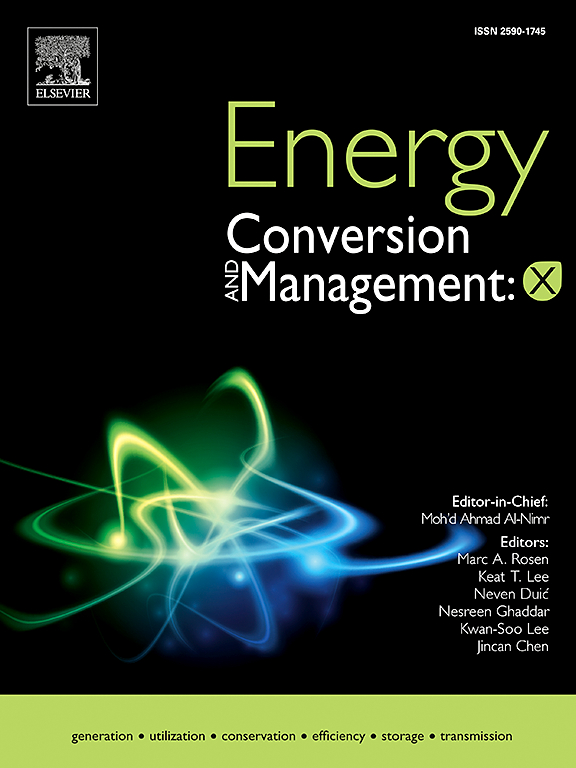Multi-objective optimization and design of a Carnot Battery for energy storage applications
IF 7.6
Q1 ENERGY & FUELS
引用次数: 0
Abstract
This study presents a numerical design and optimization of a Heat Pump-Organic Rankine Cycle based Carnot Battery, focusing on determining the optimal nominal operating conditions for selecting key components for the construction of a small-scale test rig. Initially, the mathematical models of the six Carnot batteries are established and validated by published literature data. Afterwards, the optimization procedure is divided into a single-objective optimization and a multi-objective optimization, focusing on balancing three key performance parameters of the system: energetic, exergetic and economic. In the single-objective optimization, six distinct system configurations and sixteen combinations of four environmentally friendly working fluids were subjected to analysis. A score was assigned to each combination of working fluids and system configurations. The set with the highest score undergoes multi-objective optimization to obtain a Pareto front and determine the optimal operating condition. The use of regenerators in both heat pump and organic Rankine cycle with R1233zd(E)-R1233zd(E) as the working fluid combination achieves the optimal balance between thermodynamic and economic performance. The combinations using R1234ze(Z) in the HP cycle also yielded excellent results in all systems. The design condition of the lab-scale system achieves a roundtrip efficiency of 81.30 % and LCOS of 1.09 €/kWh.
储能卡诺电池的多目标优化设计
本研究提出了一种基于热泵-有机朗肯循环卡诺电池的数值设计和优化,重点是确定最佳的标称运行条件,以选择用于小型试验台建设的关键部件。首先,建立了六种卡诺电池的数学模型,并用已发表的文献数据进行了验证。然后,将优化过程分为单目标优化和多目标优化,重点平衡系统的三个关键性能参数:energetic、exergy和经济性。在单目标优化中,对六种不同的系统配置和四种环保工作流体的16种组合进行了分析。对工作流体和系统配置的每种组合都进行了评分。对得分最高的集合进行多目标优化,得到帕累托前沿,确定最优运行条件。以R1233zd(E)-R1233zd(E)为工质组合,在热泵和有机朗肯循环中均使用蓄热器,实现了热力性能和经济性能的最佳平衡。在HP循环中使用R1234ze(Z)的组合在所有系统中也产生了出色的效果。在实验条件下,系统的往返效率为81.30%,LCOS为1.09€/kWh。
本文章由计算机程序翻译,如有差异,请以英文原文为准。
求助全文
约1分钟内获得全文
求助全文
来源期刊

Energy Conversion and Management-X
Multiple-
CiteScore
8.80
自引率
3.20%
发文量
180
审稿时长
58 days
期刊介绍:
Energy Conversion and Management: X is the open access extension of the reputable journal Energy Conversion and Management, serving as a platform for interdisciplinary research on a wide array of critical energy subjects. The journal is dedicated to publishing original contributions and in-depth technical review articles that present groundbreaking research on topics spanning energy generation, utilization, conversion, storage, transmission, conservation, management, and sustainability.
The scope of Energy Conversion and Management: X encompasses various forms of energy, including mechanical, thermal, nuclear, chemical, electromagnetic, magnetic, and electric energy. It addresses all known energy resources, highlighting both conventional sources like fossil fuels and nuclear power, as well as renewable resources such as solar, biomass, hydro, wind, geothermal, and ocean energy.
 求助内容:
求助内容: 应助结果提醒方式:
应助结果提醒方式:


